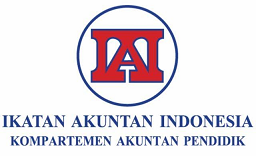PENGARUH FAKTOR MIKROEKONOMI DAN MAKROEKONOMI TERHADAP KEBIJAKAN HUTANG PERUSAHAAN
Abstract
The purpose of research is to get empirical evidence about the effect of microeconomics and macroeconomics factors to debt policy. This research used the Financial Companies which is listed in Indonesia stock exchange started the year 2014-2018 with total 32 Companies. Samples are selected based on purposive sampling method with the purpose to get sample according to research aim. Sample consists of 160 observations. The analytical technique was multiple regressions. The research results show that microeconomics factors which are proxied by corporate growth, corporate size, and blockholder ownership has significant effect to debt policy. However, macroeconomics factors which are proxied by political stability and inflation rates has no significant effect to debt policy.
Downloads
References
Brigham, Eugene F., dan Houston, Joel F. 2011. Dasar-dasar Manajemen Keuangan. Edisi 11, Buku 2. Jakarta: Salemba Empat.
Bank Indonesia. 2019. Surat Utang Luar Negeri Indonesia. Jakarta: Bank Indonesia.
Darsono. 2001. Corporate Governance: State of the America. Jurnal Bisnis Strategi. Vol. 7.
Dictio. 2019. “Apa yang Dimaksud dengan Blockholder Ownership?”. https://www.dictio.id/t/apa-yang-dimaksud-dengan-blockholder-ownership/120685. (Diakses tanggal 10 Oktober 2019).
Fahmi, Irfan. 2014. Manajemen Keuangan Perusahaan dan Pasar Modal. Jakarta: Mitra Wacana Media.
Firmansyah, R. Y., Sudarma, M., dan Widia, Y. P. 2016. Faktor Internal dan Eksternal yang Berpengaruh terhadap Kebijakan Hutang dan Nilai Perusahaan. Jurnal Balance. Vol. XVIII, No. 1.
Gumiwang, Ringkang. 2018. “Mengapa Perusahaan Terbelit Utang Hingga Berakhir Pailit?”. http://tirto.id/mengapa-perusahaan-terbelit-utang-hingga-berakhir-pailit-cEow. (diakses tanggal 12 Agustus 2019).
Hanafi, Mamduh M. 2016. Manajemen Keuangan. Edisi Kedua. Yogyakarta: BPFE-Yogyakarta.
Hidayat, M. S. 2013. Pengaruh Kepemilikan Manajerial, Kebijakan Dividen, Strukur Aktiva, Pertumbuhan Penjualan, dan Ukuran Perusahaan terhadap Kebijakan Utang. Jurnal Ilmu Manajemen. Vol. 1, No. 1.
Ifada, Luluk M., dan Yunandriatma. Faktor-faktor yang Berpengaruh terhadap Kebijakan Hutang Perusahaan. Jurnal Akuntansi dan Audit. Vol. 14, No. 1.
Khanna, Sakshi., Srivastava, Amit., dan Medury, Yajulu. 2015. The Effect of Macroeconomic Variables on the Capital Structure Decisions of Indian Firms: A Vector Error Correction Model/Vector Autoregressive Approach. International Journal of Economics and Financial Issues. Vol. 5, Issue 4.
Kosmidou, Kyriaki. 2008. The determinants of banks’ profit in Greece during the period of EU financial integration. Managerial Finance Journal. Vol. 34. No. 3.
Lestari, Desi. 2014. Pengaruh Blockholder Ownership, Ukuran Perusahaan, Risiko Bisnis, Dan Nondebt Tax Shield Terhadap Kebijakan Hutang Perusahaan Yang Masuk Di Jakarta Islamic Index. Jurnal Ekonomi dan Bisnis Islam. Vol. IX. No. 1.
M’ng, J. C. P., Rahman M., dan Sannacy S. 2017. The Determinants of Capital Structure: Evidence from Public Listed Companies in Malaysia, Singapore, and Thailand. Cogent Economics and Finance. Vol. 5.
Maryasih, L., dan Gemala, M. Z. 2014. Analisis Pengaruh Blockholder Ownership dan Asset Tangibility terhadap Kebijakan Hutang pada Perusahaan Telekomunikasi yang Terdaftar di BEI Periode 2008-2011. Jurnal Dinamika Akuntansi dan Bisnis. Vol. 1. No. 1.
Memon, P. A., Rus R. B. M., dan Ghazali Z. B. 2015. Firm and Macroeconomic Determinants of Debt: Pakistan Evidence. Procedia-Social and Behavioral Science. Volume 172.
Mukhlis, Imam. 2012. Kinerja Keuangan Bank dan Stabilitas Makroekonomi Terhadap Profitabilitas Bank Syariah di Indonesia. Jurnal Keuangan dan Perbankan. Vol. 16. No. 2.
Nyamita, M. O., Garbharran, H. L., dan Dorasamy N. 2014. Factors Influencing Debt Financing within State-owned Corporations in Kenya. Journal of Economics and Behavioral Studies. Vol. 6, No. 11.
Ramadhany, R., Aminah, M., dan Permanasari, Y. 2015. Analisis Faktor yang Mempengaruhi Kebijakan Hutang Emiten Pertanian di Bursa Efek Indonesia. Jurnal Manajemen dan Organisasi. Vol. VI, No. 3.
Razak, A.M., dan Suhadak. 2019. Pengaruh Worldwide Governance Indicators dan Macroeconomic Terhadap IHSG. Jurnal Administrasi Bisnis. Vol. 70 No. 1.
Sanjaya, R., 2014. Variabel-variabel yang Mempengaruhi Kebijakan Hutang. Jurnal Bisnis dan Akuntansi. Vol. 16, No. 1.
Sanusi, S. W., dan Nazar, M. R. 2014. Analisis Pertumbuhan Perusahaan, Profitabilitas, dan Dividen Terhadap Kebijakan Hutang Perusahaan. Jurnal Keuangan dan Bisnis. Vol. 12. No. 2.
Saputra, Doni H., Munthe, Inge L. S., dan Sofia, Myrna. 2017. Pengaruh Cash Flow, Kebijakan Dividen, Struktur Aktiva, Blockholder Ownership, Pertumbuhan Perusahaan terhadap Kebijakan Hutang pada Perusahaan Manufaktur yang Terdaftar di Bursa Efek Indonesia Periode 2011-2015. Jurnal Ilmiah Akuntansi. Vol. 1.
Soraya, dan Permanasari, M. 2017. Faktor-faktor yang Berpengaruh terhadap Kebijakan Hutang Perusahaan Non Keuangan Publik. Jurnal Akuntansi dan Audit. Vol. 19, No. 1.
Wiliandri, Ruly. 2011. Pengaruh Blockholder Ownership dan Firm Size terhadap Kebijakan Hutang Perusahaan. Jurnal Ekonomi Bisnis. No. 2.
Web www.bi.go.id
Web www.bkpm.go.id
Web www.bps.go.id
Web idx.co.id
Web www.info.worldbank/governance/wgi
Jurnal Akutansi dan Keuangan allows readers to read, download, copy, distribute, print, search, or link to the full texts of its articles and allow readers to use them for any other lawful purpose. The journal allows the author(s) to hold the copyright without restrictions. Finally, the journal allows the author(s) to retain publishing rights without restrictions
Authors are allowed to archive their submitted article in an open access repository
Authors are allowed to archive the final published article in an open access repository with an acknowledgment of its initial publication in this journal







